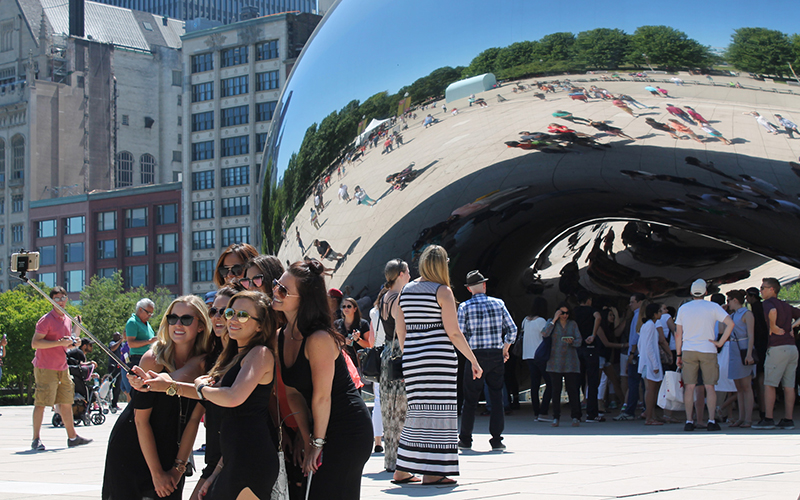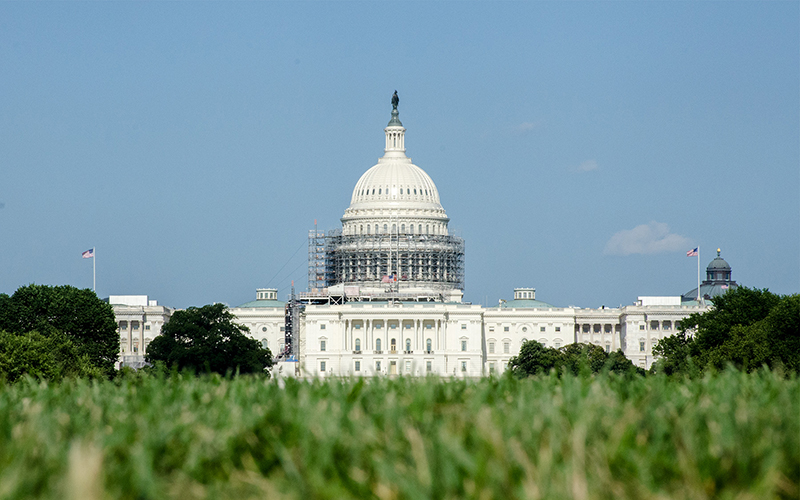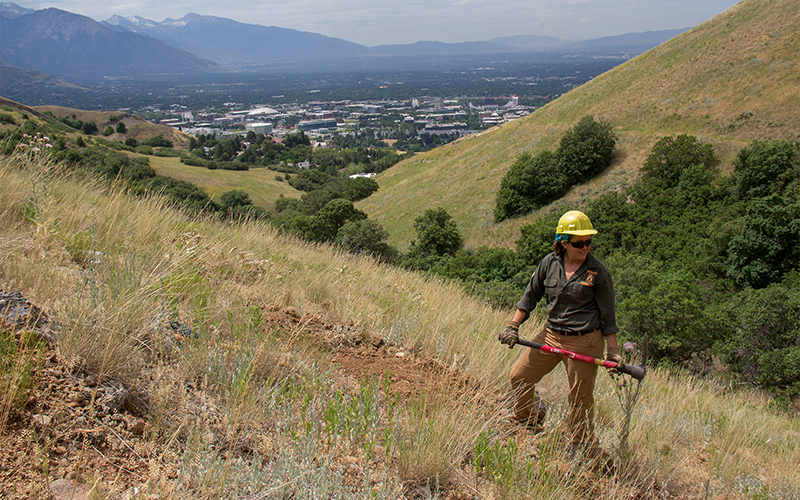Editor’s note:
This story was produced by the Walter Cronkite School-based Carnegie-Knight News21 “Voting Wars” national reporting project.
And they’re the least likely generation to turn up at the polls this November.
However, many young Americans do care about politics. They may just show it differently than their more-traditional parents.
As of April, the U.S. Census Bureau estimated there were about 69.2 million millennials, roughly defined as Americans age 18 to 35, in the U.S. electorate, according to a Pew Research Center study. This group makes up about a third of the voting-age population, matching the baby boomers.
And that means they have the potential to strongly influence upcoming elections. But will they? Here’s what you need to know about millennials and voting.

A group of millennials take a selfie in front of Cloud Gate, commonly known as “The Bean,” in downtown Chicago. (Photo by Elizabeth Campbell/News21)
They differ from previous generations, both socially and politically
Millennials are more diverse than any generation before them. According to 2014 census data, 44 percent of them identify as nonwhite.
Elli Denison, director of research for the Center for Generational Kinetics, a Texas-based consulting firm that specializes in generational research, said millennials have grown up with diversity and celebrate it.
“They really value that,” Denison said. “They look at a group of people and think ‘Oh, dear, we all look the same.'” And that troubles them.
Mike Hais, co-author of the book “Millennial Majority: How a New Coalition is Remaking American Politics,” agreed. He said this diversity has led to the generation being more accepting, which affects their political views.
“They tend to be the most socially tolerant generation in America,” Hais said. “Immigration, gay rights and the like, for all these reasons, their attitudes tend to be progressive and tolerant. They really are, in that sense, a very distinctive generation.”
Those distinctions doesn’t always correlate along party lines, either. According to a 2016 Gallup poll, 44 percent of millennials identify as independents, while 28 percent identify as Democrats and 19 percent Republicans.
Hais also called the millennials “the most female-driven generation in American history” thanks to high enrollment numbers for women in college. In 2015, about 11.5 million women were expected to attend colleges and universities, compared with 8.7 million men, according to the National Center for Educational Statistics.
Joan Kuhl, founder of the site WhyMillennialsMatter.com, said the millennial generation is “the most educated generation yet.”
But the increases in educational attainment comes at a price. This generation has high levels of college debt, another factor in the millennial puzzle, Kuhl said. It’s also a reason, she said, this generation gets saddled with the “entitled” label.
“‘Entitled’ is misunderstanding the debt piece,” Kuhl said. “They say, ‘I want financial security. I want steady increases in pay because I want to get my feet on the ground, not because I want to spend it on silly things.’
“The people who are most offended by millennials acting entitled is other millennials who don’t feel entitled. They get so upset with other millennials that don’t show up on time and all those entitled things. They’re just like ‘What? Why would you think that’s OK?'”
However, Kuhl said the entitled label isn’t the most damaging stereotype about this generation: It’s the belief they are “job hoppers.” She said companies have shown reluctance to train and invest in millennials since they think they’ll move on to a new job.
“They think, ‘I’m just going to make them figure it out on their own,” Kuhl said. “But in reality, millennials are thinking ‘I’m looking for intellectual growth. I want to be a contributor here.’ They are actually a pretty loyal generation.”
Some data suggest otherwise. A 2016 Gallup report on millennials indicated that 21 percent of millennials reported changing jobs within the previous year – more than three times the number of nonmillennials. The report also said the majority of millennials weren’t engaged with their job or company.
On the personal front, millennials are waiting the longest of any of the grown generations to get married and have their own home. According to a 2016 Pew Research Center study and census data on millennials, 32.1 percent lived with their parents, and 57 percent were married by age 30. In comparison, 90 percent of 30-year-olds lived on their own, and 89 percent had married in 1975.

Millennials consistently have the lowest election turnout among all generations, and experts say election laws in many states aren’t helping young people access the polls. (Natalie Griffin/News21)
They vote less often than other generations
Millennials consistently have the lowest election turnout among all generations. According to the U.S. Census Bureau, only 17.1 percent of 18- to-24-year-olds voted in 2014, compared with 59.4 percent of those 65 and older.
Why? Some experts on the generation said one of the most prevalent reasons is that millennials tend to move around – a lot.
At some point in their lives, 51 percent of millennials moved for employment, 46 percent moved for or to find a romantic partner, and 44 percent had moved for family, according to a study of 1,000 people between the ages of 18-35 from the moving company Mayflower.
This constant moving around often means re-registering to vote or requesting absentee ballots. However, the 50 states and thousands of counties have different rules, which can lead to confusion.
Some states also passed legislation that seem to target millennials, said Russell Dalton, a political science professor at University of California, Irvine, and author of the book “The Good Citizen: How a Younger Generation is Reshaping American Politics.” This includes forcing people to register in person the first time, shortening registration windows, refusing to accept student ID cards or rejecting certain documents as proof of residency.
“There is a whole set of institutional reforms that if politicians wanted to get young people to vote, they could,” Dalton said. “But politicians are happy with the status quo.”
Abby Kiesa, youth coordinator and researcher for the Center for Information and Research on Civic Learning and Engagement, said several barriers keep young people from voting. Along with the legislative hurdles, Kiesa said communities don’t often reach out.
“We don’t do a very good job as a country in integrating and welcoming young people into democratic process,” Kiesa said.
Moumita Ahmed, co-founder of the group Millennials for Bernie, agreed. She said she’s seen her peers struggle with all the steps involved in the registration process.
“Many of us aren’t registered because the current election laws are terrible,” Ahmed said. “It is actually really difficult, even when you do register, to process the entire thing.”
However, even when states and jurisdictions do make it easy to register and vote, it doesn’t necessarily mean millennials will make it to the polls.
Millennials often describe themselves as disillusioned and distrustful of the political system. Ryan Keating, a 33-year-old self-described drug policy reform activist from Salt Lake City, said the political system makes millennials feel like they are being talked at, not to. And no one is trying to fix millennial issues.
“Why would millennials be trustful of this system?” Keating said. “It would be hard to come up with the reasons.”
According to a 2016 poll by the Harvard University Institute of Politics, 47 percent of millennials feel that America is heading on the wrong track, and 48 percent agree that “politics today are no longer able to meet the challenges our country is facing.”
Millennials also lack faith in the traditional two-party system, which is why so many are independent.
“I have no party loyalty to the Democrats – zero,” Keating said. “I wish I had a party I could identify with.”
Political strategist Luke Macias, CEO of Macias Strategies LLC, said millennials just aren’t as connected to local governments as older generations, so they don’t see the value in voting.
“There is a level of apathy in millennials, but the baby boomers were apathetic at 18 too,” Macias said. “I don’t think most millennials see the impact an elected official has on their lives, and as they get older and get more involved, they’ll see that these elected officials are the ones making the decisions.”
They care about a wide range of issues
Because millennials tend to distrust politicians, they often pay more attention and spend their time on issues rather than parties. Maurice Forbes, the youth vote director for NextGen Climate in Nevada, said he sees this trend with college students.
“I hear a lot from theses campuses across Nevada that ‘I care about these specific issues that are going to be affecting me and less so about a particular candidate that is expressing their views on that,'” Forbes said.
But it’s not just two or three main issues that stand out to millennials. They feel passionate about a wide range of issues.
Millennials don’t necessarily consume news and information the same way previous generations did – from the nightly broadcast news or the daily newspaper. But that doesn’t mean millennials don’t care about the world, according to a study by the Media Insight Project.
In fact, the study suggested that millennials’ access to technology and social-media platforms has actually widened their awareness of issues. “Millennials also appear to be drawn into news that they might otherwise have ignored because peers are recommending and contextualizing it for them on social networks, as well as on more private networks such as group texts and instant messaging,” the study said.
Harvard student Kevin Sani, a member of the group that launched the college’s 2016 political poll, said this constant access to media actually creates a polarization among millennials because they gravitate toward information and sources they care about.
“Nobody really wants to read news that disagrees with them,” Sani said. “We all want news that agrees with us as a confirmation of our own beliefs, so that can further enhance the echo chamber effect.”
Recent national polls have indicated millennials often care most about the same issues other generations do: No. 1 being the economy (jobs, minimum wage, paid leave), according to a USA Today/Rock the Vote poll.
Money issues also play a big role in their lives, and college affordability and student debt was the second most popular answer. Other top issues included foreign policy and terrorism, health care, guns and climate change, according to the poll.
Their answers ranged from stopping the Islamic State group and ending the so-called war on drugs to eliminating poverty and providing free education from kindergarten to college.

HeadCount, a voter registration group that targets young people, went to the Slightly Stoopid concert in Mesa, Arizona, to register voters. (Photo by Natalie Griffin/News21)
Organizations get creative to reach potential voters
Millennials for Bernie hosted T-shirt screen printing and dance parties. HeadCount traveled to concerts across the country. Rock the Vote went to Comic-Con. And President Barack Obama played Operation and made friendship bracelets on a video on BuzzFeed.
All in the name of voter registration.
Voting groups across the country are realizing if they want to appeal millennials, they’ve got to make the process fun.
“In a word, that approach makes perfect sense,” Hais said. “Millennials, as a civic generation, are very group oriented and other-directed. In addition, it’s simply efficient to try to enlist people in venues where they gather in large numbers.”
HeadCount, a New York-based nonprofit organization, hosts voter registration drives at music festivals and concerts across the country. By combining music and politics, HeadCount has registered more than 300,000 voters since 2004.
“We’re catching people where they’re having fun,” said Aaron Ghitelman, the communications manager for HeadCount. “If somebody’s in a good mood, they’re more likely to register.”
They can change American politics
Historically, millennials have not shown up to vote. But that does not mean the generation hasn’t influenced political institutions.
The millennial population overtook baby boomers as the largest generation in 2015, according to the U.S. Census Bureau. In Utah, the millennial generation has been larger since at least 2000, according to the Utah Foundation, a public policy research firm.
Salt Lake City is home to the second-highest percentage of 25- to 34-year-olds in the country among major cities – second only to Austin, Texas. And the city’s politics reflect its young population.
The city has long been a left-leaning island in the middle of historically conservative Utah, but the city’s politics are becoming even more progressive – and election data show the liberalism is slowly spreading to nearby counties.
Salt Lake County voted for President Barack Obama in 2008. Last year, Salt Lake City elected an openly lesbian mayor, Jackie Biskupski. And this year, the city rallied around Democratic socialist Bernie Sanders.
Experts said these changes would not have happened without millennials.
“I just can’t imagine that we would have had Mayor Biskupski elected 20 years ago,” said Pamela Perlich, the director of demographic research at the University of Utah’s Kem C. Gardner Policy Institute. “There has been a great change in society as well, on these issues. And it’s a little bit hard to disentangle those, but there are many places in the state where she would not have had a chance.”
The city began to morph during the economic boom of the 1990s. Immigrants came to the city and had kids, and now those kids are reaching voting age. Perlich said young people move to the area to take advantage of planned urban development projects and because Salt Lake City houses the state’s flagship university.
“The place has just become increasingly more progressive, as people from outside of Utah move to Utah,” Perlich said. Millennials come to enjoy nature along with employment and recreational opportunities, she said.
But voting for left-leaning political candidates is not the only way Salt Lake City residents drive change. Residents have pushed for more progressive policies in health care, environmental protections and lesbian, gay, bisexual and transgender issues.
Millennials define citizenship not as voting, “but being concerned about other people,” Dalton said. And they often show that concern by volunteering.
According to an Associated Press poll of 1,044 adults, 29 percent of Americans under the age of 30 agreed that citizens have a “very important obligation” to volunteer. Comparatively, in a 1984 University of Chicago survey of 1,441 adults, only 19 percent agreed.

Danielle Nives, 21, helps maintain Utah’s Bonneville Shoreline Trail as part of the Utah Conservation Corps, an AmeriCorps conservation group. (Photo by Natalie Griffin/News21)
“Millennials are probably the most involved generation in history in causes and nonprofit endeavors and community involvement,” Hais said. “They do tend to want to think globally and think about global issues and believe that those problems can be solved at the local level rather than depending on huge government programs to try to solve issues.”
And that means they don’t necessarily participate in the traditional political system. Keating runs a wellness practice in Salt Lake City and travels to Washington, D.C., to lobby politicians for drug policy reform, something he said is often more useful than just backing a candidate.
“People get really angry at me because they say I’m not participating in the system, and I’m like, ‘No, I’m participating in my life,'” Keating said. “I’m standing for people, and I’m standing for getting the most people involved as possible.”
Salt Lake City is just one example of changing national politics, a trend experts say is just beginning to take off across the country. Millennials are not just going through a liberal-leaning, two-party-hating, nonvoting phase. This trend might fade as the generation ages, but millennials will never be as conventional as their parents, Dalton said.
“The old, white baby boomers get old, leave the labor force, eventually die and then, the young generations – which are so profoundly multicultural, multilingual, multiethnic and just have completely different life experiences and sensibilities than baby boomers – are becoming the majority population just through the advance of aging,” Perlich said. “We’re going through a time of really terrific change, really unprecedented.”
Hais predicts that when millennials begin to take office, the hyperpartisan nature of politics will shift to something more compromise driven.
“What we will see is a change in the way things are done politically,” Hais said. “What we see now is terrible gridlock because of that baby boomer division. They can’t see eye to eye, but millennials will be different. Millennial Democrats and millennial Republicans are closer together.”
Sean Holstege contributed to this report.